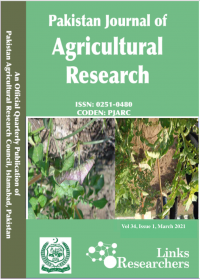Reproductive Characters and Yield of Selected Drought Tolerant Maize Varieties in a Rainforest Agroecology of Nigeria
Reproductive Characters and Yield of Selected Drought Tolerant Maize Varieties in a Rainforest Agroecology of Nigeria
Ndubuisi Chinedu Adikuru1*, Paul Inyang2, Abraham Agwu Ngwuta1, Chinyere Prisca Anyanwu1 and Rosemond Adaohuru Alagba1
ABSTRACT
Soil moisture deficit in the rainforest agroecology of Nigeria emanates from altered rainfall pattern caused by climate variability and change. Selected maize (Zea mays) varieties developed for drought tolerance were evaluated over two years to identify those which could be included in the strategy for adapting to climate variability and change in the rainforest agroecology of Nigeria. The treatments were ten (10) maize varieties (eight drought tolerant varieties, an improved hybrid adapted to the location and a landrace) and two planting years. The experiment conducted in the field was according to split-plot arrangement in a randomized complete block design. Treatments were established in three (3) replicates. The time to anthesis, time to silking, interval between anthesis and silking (ASI), time to maturity and time to filling of grains were measured. Other parameters measured were the rows of grain per cob, grains per row, grains per cob, 100 seed weight and grain yield. Results showed difference in the time of occurrence of maize developmental stages (flowering and maturity) between the years (2010 and 2011). This was attributed to inter-annual variability in climatic factors within the study area. Maize grown in 2011 flowered (anthesis) 3 days earlier and matured 5 days later than maize grown in 2010.Therefore, grain filling duration was 6 days greater in 2011 and led to 33.1 % higher yield when compared to 2010. Based on superior grain yield and kernel number in addition to lower ASI, five varieties (TZECOMP3C2DT, DTSYN-11-YF2, DTSYN-7-WF2, OBA SUPER 2, and DTSR-WCQ) were selected from this set of drought tolerant maize varieties. These were recommended for planting as part of strategy for adapting to climate variability and change in the rainforest agroecology.
To share on other social networks, click on any share button. What are these?







